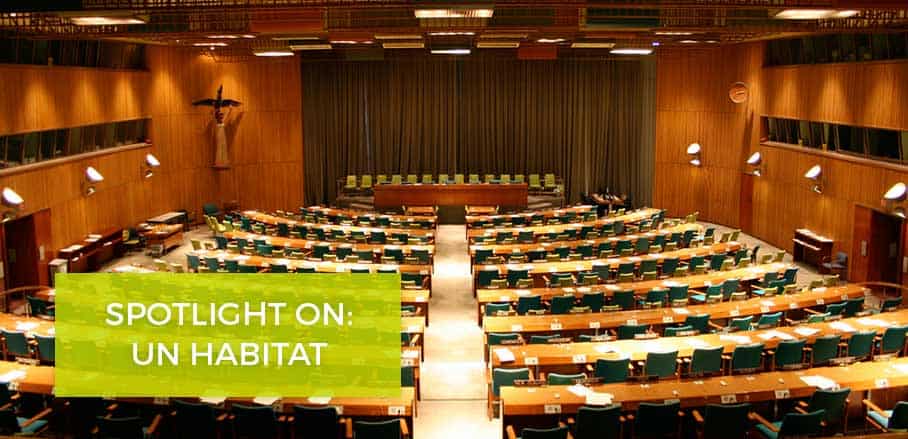UN Urban without a future, but some common ground builds up
By URBANET
This week’s high-level meeting on UN Habitat in New York City has shown that member states are committed to the Habitat process, but view critically the proposals put forward by an independent assessment panel. URBANET reports on the outcomes of the meeting.
The high-level meeting on UN-Habitat has come to a close last Wednesday night. What is very likely after these two days: UN Urban, a recommended new UN body responsible for coordinating all urban related matters within the UN system, will most probably not come into being. At least not immediately.
[inlinetweet prefix=”” tweeter=”URBANET” suffix=””]Over the past week, member states have gathered in New York City to discuss potential reform steps for UN-Habitat[/inlinetweet]. Discussions evolved around recommendations put forward by an independent assessment panel, commissioned by United Nations Secretary-General António Guterres to conduct a thorough review of UN-Habitat.
Member states react sceptically to UN Urban proposal
One main proposal received particular attention: The establishment of a new UN body – UN Urban – with a coordinating role for all urban related matters within the UN system. Member states reacted sceptically to this proposal in particular as UN Urban was presented as an additional UN entity for which financing would have to be provided. Scepticism was unabated, as the panel report did not contain any estimates on potential costs involved in establishing UN Urban. At the same time, member states provided little alternatives regarding in which other direction a UN-Habitat reform process could move. A clear vision on UN-Habitat’s future still seems to be missing. However, the discussions reflected once more the cross-sectoral nature of urban development, which cannot be left to one single UN-agency. In this respect, the UN-Habitat reform is in the front line of the overall UN reform: How can the UN be made fit for purpose to address the 2030 Agenda in a coherent way? This is a tall order and a relevant question not only for the UN.
Another unresolved issue remains the inclusion of local authorities in the UN policy process. Representatives of the Global Task Force of local and regional governments showed a bit of frustration about lukewarm responses of member states. Urban development cannot be done without the leadership of local authorities, and in collaboration with the urban citizens. Even if there is progress on the UN-Habitat reform at the end, there might be an agency. But there must also be the agents that implement sustainable urban policies.
Some common ground builds up
Even though many of the panel’s recommendations caused major criticism, the report did succeed in triggering helpful debates around UN-Habitat’s future. The meeting led to a deeper understanding of the nature of the challenge and avoided oversimplified, one-issue answers. It also showed the willingness of member states to avoid confrontations and to work together constructively. Some common ground seems to be building up: [inlinetweet prefix=”” tweeter=”URBANET” suffix=””]The necessity for much better coordination of urban-related matters across the entire UN system was clearly a point of agreement[/inlinetweet]. It also became clear that this coordination would have to be managed from New York offices to a great extent, given that the city is the prominent hub for the United Nations and its member states. But while strengthening UN-Habitat’s presence in New York seems to find some mutual agreement, it has been made very clear that this should not be at the disadvantage of UN-Habitat headquarters in Nairobi, Kenya. In other words, additional staff would have to be hired and – this is the tricky part – to be financed. Member states also agreed that UN-Habitat’s normative work needs strengthening, but not at the expense of its operational fieldwork. Some confusion remains on what that really means in practice.
Onerous reform process prevents moving forward
One thing is certain: The General Assembly will pass its annual resolution on UN-Habitat and its work this December. But what will be decided until then? The UN-Habitat reform process is far from being clearly defined and extensive discussions need to follow the two-day high-level meeting in New York. Danger persists, that the reform process is too slow and onerous and that member states will lose interest. As the term of the current Executive Director of UN-Habitat, Joan Clos, is coming to an end, the hope is that new leadership will bring about a new dynamic in the UN-Habitat reform process.
Another unknown is the broader UN reform: In December, Secretary-General Guterres will present his second report on the reform of the UN Development System, which most likely will also entail important implications for the UN-Habitat reform. The UN-Habitat reform could be the litmus test for the broader UN reform – for the good, but also for the bad.
The way forward for the UN-Habitat reform still seems to be a long and winding road. The President of the General Assembly, Peter Thomson, stated the sense of urgency: the clock for achieving the 2030 Agenda is ticking. Timid steps to make UN-Habitat, and with it the UN system, fit for the urban purpose would be too little and too late.
